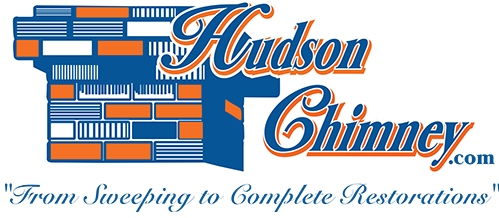by Mark Hudson | May 5, 2016 | Chimney Inspections
Exterior damage to your masonry chimney is easily noticed, but problems deep within the flue can be impossible for you to see. A lot of damage can be lurking inside your chimney, and you could be endangering yourself and your family by using your fireplace when any damage exists. This is why it is so important to have an annual professional chimney inspection. At Hudson Chimney, we have all been certified by the Chimney Safety Institute of America (CSIA) in properly inspecting chimneys. We know where to look for damage inside your flue, and we perform video scans on certain inspections we do, which allows us to see every inch of the interior of your chimney. If we do find any problems, we have the video footage that we can show you to help you understand the type of repairs needed to correct the issue. We would like to tell you a bit more about the importance of chimney inspections.
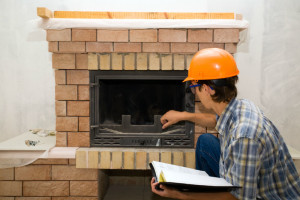
What kind of damage can typically be found inside a chimney?
One of the most common problems Hudson Chimney often finds inside chimneys is a cracked chimney liner, which can be very hazardous. If your chimney has suffered a water leak, your liner can suffer from rusting and other corrosion damage and crack and break apart. When your liner has cracks and gaps, the toxic byproducts of combustion can leak into your home. Another issue we see is chimney blockages. Many things can block your flue, including leaves, sticks, nesting materials from birds and wild animals, soot, and creosote. When your chimney is blocked, you are at a higher risk of a chimney fire and a carbon monoxide leak. Something else we often find when we inspect the interior of chimneys is a flue that is not properly sized to the heating appliance. This can cause problems including an overproduction of carbon monoxide, chimney draft issues, and inefficiencies in the operation of your fireplace and chimney.
What is involved in a chimney inspection from Hudson Chimney?
Your chimney inspection will depend on the level you need. Over a decade ago, the National Fire Protection Association (NFPA) adopted three levels of chimney inspections to remove inconsistencies in inspections and streamline the process across the country. Level 1 is the most basic level of inspection, which is included with our annual chimney sweeping services. For this level, we will carefully check out the readily accessible parts of the inside and outside of your chimney and the accessible parts of your heating appliance and its heating connection. If you have changed your heating appliance, are selling or buying a home, or have experienced a chimney fire, earthquake, or severe weather event, you will need a Level 2 inspection. This level includes everything in a Level 1 inspection, a video scan, and an examination of the attic, crawl space, or basement. If we find a potentially hazardous problem, we will recommend you have a Level 3 inspection. This level includes everything in a Level 2 inspection and the removal of components, such as the chimney crown and an interior chimney wall. While a Level 3 inspection may seem destructive, it is necessary for your safety.
Just because your chimney looks great on the outside, you could have hidden hazards lurking inside your flue. Contact us at Hudson Chimney to schedule your annual chimney inspection today.
by Mark Hudson | Apr 22, 2016 | fire safety
When you buy a home, you have to hire a home inspector to make sure there are no hidden problems with any of the major systems in the house. Your home inspector will check out the electrical and plumbing systems, the structure and foundation, and other parts of the home. After you receive the final inspection report, you may believe everything in the fireplace and chimney system works properly, but home inspectors are not necessarily chimney experts. Many of the national fire safety organizations like the National Fire Protection Association (NFPA) and the Chimney Safety Institute of America (CSIA) recommend that the chimney and venting system should be inspected by a professional certified chimney technician before you buy a home. Our CSIA-certified chimney professionals at Hudson Chimney are trained and experienced in finding damage and potential problems in chimneys and fireplaces. You may think you are saving money by not hiring a chimney technician for an inspection before you purchase a house, but there could be a problem with the system that can not only cost you a lot more money in the future, but it could also be a danger to your life. We would like to tell you about the importance of a professional chimney inspection when you are buying a home.
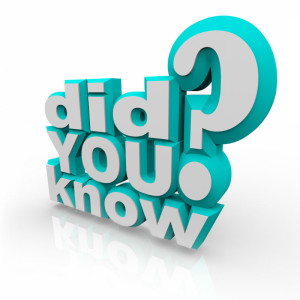
Home inspectors can miss some major problems with a chimney and fireplace system.
While home inspectors have been trained and certified to professionally inspect the major systems of a house, they usually have not received any professional extensive training concerning fireplaces and chimneys. For example, the CSIA reports that a home inspector approved a chimney and fireplace system, which was found to have some major problems by a CSIA-certified chimney sweep. The chimney inspection discovered that the height of the chimney was not tall enough to meet building code regulations, the existence of drywall exposure, and the separation of the hearth from the wall. These problems could cause chimney draft issues, fire hazards, and carbon monoxide leaks. If the homeowner had not hired the chimney sweep because the home inspector found no problems, he or she could experience a devastating fire or become ill from carbon monoxide poisoning.
Home inspectors are not required to thoroughly inspect chimneys.
The most a home inspector will typically do to check out the chimney is using a flashlight to look into the flue. A chimney inspection from the CSIA-certified sweeps at Hudson Chimney will include a video scan from a closed-circuit camera that has been designed to be used inside a chimney. We will have a close-up look at every inch of the inside of that chimney, and we can show you any damage or possible problem we may find. You will also have the needed evidence to show to the homeowner of damage that needs to be repaired before you will agree to purchase the home.
Shopping for a new home? Contact us at Hudson Chimney to schedule an appointment for a professional chimney inspection to be sure the home you are buying poses no dangerous risks from the chimney and fireplace system.
by Mark Hudson | Mar 24, 2016 | Chimney Chase Cover, chimney maintenance
Protecting your chimney from water leaks is an important part of maintaining your chimney. If you have a prefabricated chimney, you likely have a chase that is built around its metal exhaust pipe. When you have a chase around your chimney, it needs to have a good chase cover (also known as a chase pan) that will keep water out of your chimney and chase. Water is the greatest enemy of chimneys, according to the Chimney Safety Institute of America (CSIA). You want to be sure you are doing everything you can to prevent water from penetrating your chimney because of the damage water can do. Not only can water damage the metal components of your chimney, but it can also cause damage to the ceilings and walls in your home. Unfortunately, chase covers do not last forever and should be replaced when you notice any signs of damage. Hudson Chimney sells, installs, and repairs chimney chase covers, and we would like to tell you what you should look for to know it is time to replace your chase cover.
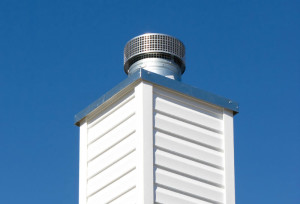
How do I know if my chase cover is damaged?
Although you may have to get on your roof to get a closer look, you will probably be able to see signs of corrosion from rusting on your chase cover from the ground. Chase covers are made from metal, and the cheaper metals tend to start rusting pretty quickly. As soon as your chase cover starts rusting, the cover will develop holes in it, and these holes allow rain to easily enter your chimney. While Hudson Chimney can repair chase covers, if the cover is made from galvanized steel, the metal is probably to weak to repair. You cannot even clean the rust corrosion off of the chase cover because it could break apart.
What should I be looking for in a replacement of my chase cover?
You want to find a chase cover made from either stainless steel or copper. You also want to be sure the cover has been designed correctly. Look for a chase cover that has been designed with a slope from the middle to the sides so that water will run off of the cover and not pool on top in the middle. When water pools on top of a chase cover, it leads to quicker corrosion. Hudson Chimney can help you select the best chase cover for your chimney. No matter if you have multiple flues in one chimney or have an unusually shaped chimney, we can customize a chase cover to protect your chimney and chase from water penetration.
Is it time to replace your chase cover? Contact us at Hudson Chimney to find out how we can help you prevent damage from water leaking into your chimney with the perfect chase cover for your chimney chase.
by Mark Hudson | Jan 10, 2016 | Water Damage And Chimneys, Winter Maintenance
Here in the Jacksonville, Florida area, we are fortunate to enjoy moderate winters, but even though we do not have to deal with much ice and snow, we do have quite a bit of rain during this season. As we have mentioned before, the Chimney Safety Institute of America (CSIA) has named water as the biggest enemy of masonry chimneys. Water from rainfall can cause quite a bit of expensive damage to your chimney, including the collapse of its structure. Hudson Chimney has been repairing leaky chimneys over the past 30 years, and we have seen some truly horrible damage done to the bricks and mortar of chimneys. Not only do we fix chimney leaks, but we also offer a few preventive services to keep water out of chimneys. We are here to help you get your chimney ready for a wet winter so you can avoid expensive chimney repairs from water damage.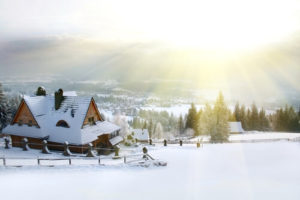
Chimney Cap Installation
An essential component of a chimney and venting system, a chimney cap keeps water from rain and melted snow out of your chimney. Without a cap, your chimney is a big hole on the top of your house. You would never leave your doors and windows open during a rainstorm, would you? Hudson Chimney can help you pick out the perfect chimney cap and professionally install it to protect your chimney from water penetration. Not only will a chimney cap keep water out of your chimney, but it will also prevent birds and animals from making a home out of your chimney. Chimney caps also keep sparks from jumping out of the top of a chimney that can ignite an accidental fire, and some types of caps can improve chimney draft problems.
Flashing
Consisting of metal sheeting, flashing wraps around the base of the chimney to keep water from entering at the point of where the chimney meets the roof. Our CSIA-certified chimney technicians will take precise measurements of your chimney to create a flashing system to protect your chimney from water penetration. We also can make repairs if your existing flashing system is damaged.
Waterproofing
To create a barrier against water penetration, Hudson Chimney provides waterproofing services. We feel that waterproofing is one of the best ways to prolong the life of your chimney. Our chimney technicians will start this service by cleaning the exterior of your chimney and then apply a layer of ChimneySaver’s Water Repellant, a 100% vapor permeable formula. This means no water will be able to penetrate into the bricks and mortar of your chimney, but any water vapors already trapped inside these masonry materials will be able to escape.
Prevention is always easier and less expensive than repairing damage. Contact us at Hudson Chimney to make an appointment for us to get your chimney ready for the wet winter.
by Mark Hudson | Nov 28, 2015 | Chimney Sweeping Logs
Have you ever wondered why you need to have your chimney professionally swept annually? Of course, your chimney gets pretty dirty from regular fires in the fireplace, but soot and dust is not the most important reason for this maintenance task. Your chimney should be cleaned professionally once a year to remove the accumulated creosote from the inner walls of the flue. A compound that forms naturally as a result of the combustion process of burning wood, creosote is extremely flammable and is the main cause of chimney fires. It is essential to get all of the creosote out of your chimney so you can enjoy your fireplace without worrying about this fire hazard. You may have seen chimney sweeping logs, a product that claims to remove and reduce creosote from your chimney, and considered that they could be a substitute for a chimney sweeping by one of the Chimney Safety Institute of America (CSIA)-certified chimney professionals from Hudson Chimney. However, this is not the case, and chimney sweeping logs can even lead to dangers in your home. We would like to tell you more about why you should never substitute a professional chimney cleaning by using chimney sweeping logs.
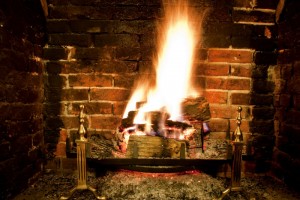
WHAT CHIMNEY SWEEPING LOGS DO
Burning a chimney sweeping log in your fireplace or stove releases chemicals that use catalytic action to remove a portion of accumulated creosote from your chimney. These chemicals cause creosote to flake off and break away from the chimney wall. While this product does remove some of the creosote, the CSIA has its concerns. The claims of chimney sweeping logs are not completely accurate and can lull homeowners into a false sense of security.
THE RISKS OF CHIMNEY SWEEPING LOGS
As we said earlier, creosote is very flammable, so when pieces of creosote are falling down your chimney after flaking off, they could easily catch on fire and lead to a devastating chimney fire. Even if the creosote does not ignite on its way down, the pieces end up at the bottom of your chimney to gather on the smoke shelf and form together to cause yet another fire hazard. Any creosote remaining in your chimney, whether or not it is stuck to the walls of the flue, poses a dangerous fire hazard.
WHY A PROFESSIONAL CHIMNEY SWEEPING IS SO CRUCIAL
Firstly, you can trust our CSIA-certified sweeps at Hudson Chimney to completely remove all of the creosote from your chimney. We know far too well the dangers of creosote, and we take great care to be sure we have gotten all of the accumulated deposits out of your chimney. Not only do we thoroughly clean your chimney, but we also provide a professional inspection with every chimney sweeping. Our sweeps will closely examine the interior and exterior of your chimney to look for any damage that needs to be fixed for your fireplace and chimney to function effectively and safely. If any debris such as nests from birds and animals or leaves are blocking your chimney, we will also remove the blockage to prevent any accidental fires or carbon monoxide leaks.
Have you had your chimney professionally swept this year? Stay away from chimney sweeping logs, and contact us at Hudson Chimney to make an appointment for a safe chimney this winter.

